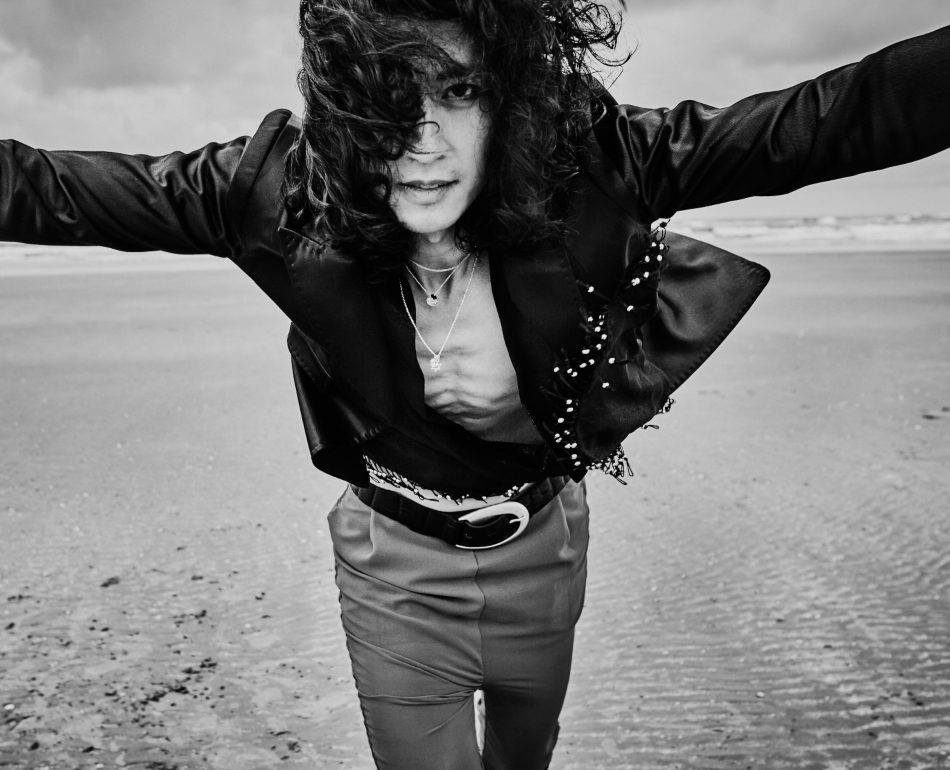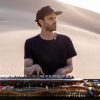Ilja Alexander, a London based dream-pop artist is making himself a firm favourite with fans with his latest release. ‘Someday’ via Green Monk Records, strikes the sweet point between nostalgia and daydreaming, bittersweet and wistful. The official music video for the single was featured in CLASH Magazine and we’re expecting it to garner substantial interest in both Japan and Indonesia, where a solid fan base can be found.
Originally from the picturesque city of Amsterdam, Ilja Alexander had a gifted piano player for a grandfather. Between his grandfather’s skills and hearing his father play Beethoven’s Für Elise, Ilja had all of the perfect little pushes to start him on his musical journey. After discovering other people showed an interest in hearing him perform professionally, the singer-songwriter began to make more serious moves towards a career in the industry.
On his journey, Ilja Alexander has turned towards introspection, evaluating his life choices and the impact they have had. Curious about what this mindful musician could teach us, we sat down for an exclusive interview.
Set the tone for us. Why the arts?
Why the arts? That is exactly what my parents asked in disbelief before. I think they’d preferred me becoming a doctor or business manager, although my mother admitted that she did dream of me becoming a famous conductor prior to my birth. But why the arts? I started piano classes at a very young age and found myself to be quite good at it, but that was long before I was able to make a conscious choice about it. Then life caught up with me and abruptly changed, causing an emotional disconnect through traumas and scars.
In high school, I occasionally dreamed of being a musician, and in fact, was quite focused on studying classical piano. I was just too disconnected from myself to understand my own interest in the arts. Selecting universities, I considered applying to the royal conservatory of Amsterdam, but life took me to enrol in an economics study. I was great at studying and learning and never really had to work hard or pay too much attention at classes to get high grades. Frankly, I was so disconnected from myself, disinterested and dreadfully bored with studying, that I changed study and even university five times, ranging from economics to engineering, but never arts. Throughout being a student, I skipped many classes, wasn’t too involved in student life, but found myself more and more behind the piano, slowly moving from classical piano to songwriting, ventilating my thoughts.
Reading my own lyrics from that time, I must admit they were darker thoughts. Then, one of my sisters trained to be a professional singer and my brother started playing drums in bands, birthing the ambition within me to start competing with them in music, and being still in emotional disconnect, I was not able to consciously express my inner feelings and interests to music. An invisible force guided me to start a career as a singer-songwriter after graduating from economics, took me on a path to releasing my first CD and taking me on tours to Indonesia and Japan. The same force led me to meet US songwriter and producer Curtis Richardson, and connected me to all people that have enabled me to produce my newer songs, and only now that I have healed past traumas and scars and have begun to connect to my own emotions, I have come to understand that creating music and performing arts are true passions to my heart and soul.
Which comes first when you’re producing – the sound or the idea?
I always start with writing a song. Mostly, I write songs while playing the piano, following the lead of the chords that find my way, triggering emotions. I then try to find lyrics that best match the emotions and new melodies. Occasionally, I hear songs and music and attend gigs or even symphonic concerts in dreams. Realising that I dream, I then force myself to wake up and take recording notes. When songwriting, I sometimes access these recording notes and build songs around it. After the songwriting, I sometimes pre-arrange my own songs, picking instruments and sounds, before sending them for further collaboration to a producer. I guess, in my case, the sound comes first, be it the piano chords, the music in dreams or the musical pre-arrangings to the producer.
Does your material feature any collaborations?
“Someday” has been remixed by German DJ/producer Marvin Dörsam. Also, another single has been remixed by a Tokyo based DJ and producer Ram Rider. I have a few more recordings that I wish to remix in collaboration with other DJ’s/producers.
What’s on your current playlist?
I have several playlists. One playlist includes British and American electro-pop and indie bands. It includes Imagination by Foster The People, Dear to Me by Electric Guest, Feel Alright by Poolside and Everything Now by Arcade Fire. I have another playlist with songs that influenced me in the past. This includes The Drugs Don’t Work by The Verve, One Dream by The Dream Academy, When I Was a Boy by ELO, Golden Slumbers by The Beatles and Stand By Me from Oasis. Lastly, I have another playlist for songs that I have newly discovered, but not necessarily new releases. This list includes Face To Face by Rex Orange County and Circles by Post Malone.
Tell us about the chemistry you have with your fans on stage.
As a consequence of being disconnected from my own emotions, I wasn’t really able to connect to the emotions of other people. Of course, I enjoyed the interaction with my audience and fans, and where possible always favoured intimate settings so that I could really take the time to interact and speak with fans, interested in learning more about their cultures, understanding them. But in a way, it has always been an analytical approach and interest. Now that I am emotionally opening up, it will surely change the dynamics between me and fans on stage. How? Both you and I will need to wait and see. 🙂
What techniques do you experiment with to get your original sound?
It may sound strange, but in my case, the most important technique I use is a meditation technique to clear my mind and to be more receptive to creative input. When songwriting, arranging or otherwise creating music, I experiment with piano chord progression and rhythm, and also experiment with sounds from DAW software or drum computers. Different sounds give different emotions, so sometimes the emotion defines the sound, but often selecting a new sound, gives me an entirely new emotion and song.
Take us through a day in the recording studio.
I pick recording studios for a good atmosphere. A recording process is about social interaction, interacting with producers, vocal producers, recording engineers, etc. It is about creating energetic synergy between everyone involved in the recording process. I always have a vocal producer, a vocal coach and a recording engineer present in the studio. Normally, I’d start early morning, drinking tea or coffee, chatting a bit with everyone, before doing a 20 min vocal warm-up with my vocal coach. Then I’d normally like to test record various microphones. I’d instruct the vocal producer to take the lead, instructing and directing me what and when to record. It is teamwork. I often end up in heated discussions on whether to agree or disagree with comments made by the vocal producer or my vocal coach, but I always leave room for everyone to give creative input, so the outcome always positively surprises us all.
The first half of the day I would record my vocals. I always make sure to bring good catering, to include nice sandwiches, lots of vegetarian and vegan options, healthy snacks, and unhealthy candies. After I’m done recording my lead vocals, we would then turn to record all backing vocals. I often record 2 or more songs in one day, so we would have a dinner break in the studio and finish up afterwards. If finished before dinner time, I always find it nice to have a joint dinner afterwards to relax and socialize. I’d make sure there is absolutely no stress to anyone during a recording day and that recording a song is not about work, but about social interaction and creating together.
Was there a specific moment in your life where you thought, “this is what I want to do”?
That is an interesting question. In fact, I never really had a voice telling me “this is what I want to do” before. However, things changed in recent years. It included many thoughts of “this is what I don’t want to keep doing”, but to materialise what you don’t want to do, and thus kill metaphoric vampires from your life, requires great amounts of energy to take off on another path. Fortunately, 2019 included lots of thoughts “this is what I want to do” that I have materialised. It included my collaborations with Curtis Richardson, my band formation and rehearsals in London, and even enrolling in jazz dance classes and musical theatre classes. For 2020, I have a new “this is what I want to do” thought to start live shows in the UK with my band.
What do you keep close by while you’re playing a set?
During live gigs, I keep the memories of background stories to my own songs or memories of the creative processes behind recordings close by.
Any emerging artists on your radar?
My good friend Harry Lloyd with his band Waiting For Smith in the UK. I probably do know more emerging artists, but the definition of an emerging artist is a bit unclear to me, so nothing pops up in my head right now. 🙂
What gets your creative juices flowing?
A balanced and healthy lifestyle, preventing mental and financial stress, social interaction and meditation and spending lots of time in nature.
Take us through your collection of gear, tech or software that accompanies your creative expression.
I have a real upright piano, but mostly use my digital Kurzweil stage piano with a pair of Beyer Dynamics headphones to write songs. I have a macbook pro connected to an outdated Edirol firewire sound card and use Logic Pro X, Ableton and Native Instruments to pre-arrange my songs. I also have a Gretsch G6120SSL Brian Setzer Nashville Orange Lacquer electric guitar but, unfortunately, I am not a great guitar player yet. I track my guide vocals with a cheap SE Electronics sE2200A with a reflection filter pro and Roland popfilter. More and more I use voice memos on my iPhone to record song concepts, melodies and lyrics.
Any side projects you’re working on?
Currently not. I still need to combine my career in music with a daytime part-time job as IT programme manager, so I lack the time to do side projects.
How have you refined your craft since you entered the industry?
I never stop to refine my craft but, for now, I focus on voice, speech and performing skills. I continue to take weekly coaching classes in singing and English speech and last year I started taking classes in jazz dance and musical theatre in London to add to my performing skills.
Breakdown the news for us: what can we expect from you this year?
I intend to release a new single every 6 weeks, perhaps even a mini-album or EP somewhere Q3-4 of this year. I also hope to start live gigs soon with my band in London. Moreover, in 2020 I will continue to work on personal growth, so likely you will see an evolution in my music and me as a person.
Famous last words?
Take better care of each other and nature
Follow Ilja Alexander:
Website – Facebook – Twitter – Soundcloud – Instagram – Youtube – Spotify




